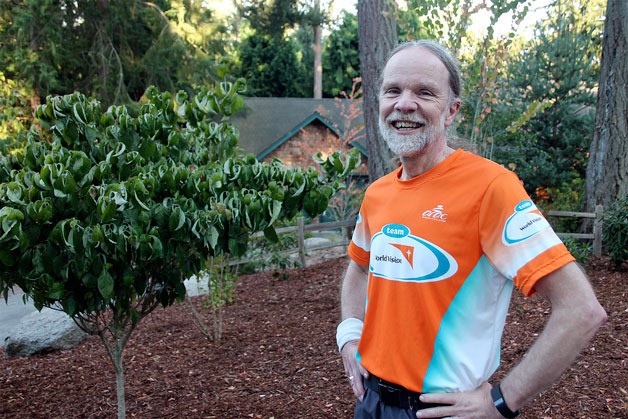Arne Bergstrom has been running to let off steam since 1980, but later this month there is a noble cause that’ll keep his legs chugging …and chugging … and chugging.
Bergstrom, who lives in Langley, will take his habitual running across the Washington-Oregon state line to partake in the 35th annual Hood to Coast Relay, one of the longest and largest relays in the world.
A total of 1,050 12-person teams will go at their pace over the course of 18 hours.
The course begins early in the morning in Timberline Lodge, Ore., on the slopes of Mount Hood and heads west through the Portland metr area, over the Oregon Coast Range and concludes on the beaches of Seaside, Ore.
A total of 12,600 runners will compete with their teams during the 199-mile relay.
Bergstrom will be competing on a team composed of runners who work for a former employer, the Christian humanitarian aid organization World Vision.
He and Team World Vision set the goal of raising $10,000 per runner in the lead up to the relay.
World Vision has 10 different teams competing, each with 12 runners. If all the runners meet their fundraising goals, World Vision will raise $1.2 million.
Bergstrom says this is World Vision’s largest fundraiser of the year.
All money raised goes toward a specific cause.
“I am joining Team World Vision for the Hood to Coast Relay event this August to help raise funds for water for children, families, and communities in South Sudan,” Bergstrom said.
Competing in the relay is personal for Bergstrom.
“Our family lived in Sudan from 1985 to 1987 as part of the famine response of World Vision. I was on the design team that developed a dry ration feeding program for one million people in the Blue Nile Region of Sudan.”
“The newly formed country, which was part of Sudan in the 1980s, struggled to provide its people with basic needs such as clean water.
Bergstrom says now that South Sudan is a country, it’s been playing catch up, and one of the largest problems the country faces is access to clean water.
“Clean water impacts health, agriculture and even education,” Bergstrom said. “Without easy access to drinkable water, kids often don’t go to school because they have to walk for miles to find the day’s water supply.”
The nature of Bergstrom’s work leaves a heavy burden, even on the toughest people.
Being a witness to famine and natural disasters requires an outlet to decompress, so he dusted off his running shoes while living in the Philippines.
That was in 1980, and he says he’s been running ever since as a way to cope with the hardships he’s witnessed, including genocide in Rwanda and refugee response on the Thailand-Cambodia border and Kosovo.
“Arne and his wife are dedicated to helping those in need and offering ministry to children and adults through teaching and music,” said Susan Knickerbocker, who attends church at Trinity Lutheran Church with Bergstrom.
“He is quite thoughtful and volunteers wherever needed from what I observe.”
Bergstrom says seeing the world through his running is a different experience from simply driving through it.
Someone driving through East Africa would see a different picture than someone running through the region, as Bergstrom can attest to as he had an experience that would make Forrest Gump proud.
“In East African cities, the altitude is really high, and that’s where the fun was,” Bergstrom said. “Kids would start passing me, then old ladies running after the bus would pass me.”
There is plenty to learn from people living in adverse situations, according to Bergstrom. Throughout the years as a first responder in the toughest of situations, Bergstrom realized a sense of community can be crucial to survival, and dependency on others can act as a coping mechanism. He says Americans take it for granted; we are taught to be self-reliant because we have the ability to be independent. But in a hard and often rural life, a sense of community can enhance survival. In helping those in need, they helped teach him to build closer relationships with others. Now he’s doing his bit to return the favor with the fundraiser.
“As a practicing Christian, helping those in need is vital to our beliefs,” Knickerbocker said.
“If the unbelieving world doesn’t see the faithful helping others, then what kind of model are we?”
This is what Arne and his wife believe, and it’s easy to see from how they live,” she said.



